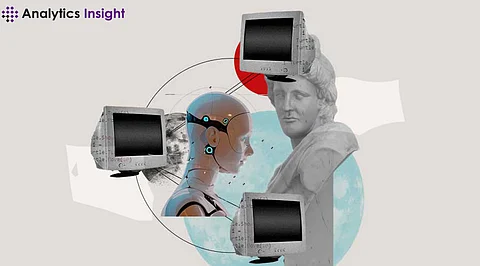

AI-powered business intelligence is basically the use of AI tools such as machine learning, natural language processing, and computer vision to optimize business functions, boost employee productivity, and drive business value. Organizations leverage Business Intelligence to strengthen data analysis, improve customer experiences, generate content, and optimize IT operations, sales, marketing, and cybersecurity practices, among other applications. As AI technologies evolve, new business use cases emerge, supporting human workforces in optimizing workflows and making operations more efficient. For effective AI implementation in business, organizations need a clear understanding of their business functions and how AI can enhance them.
AI-powered BI combines advanced analytics and machine learning algorithms with traditional BI techniques to extract valuable insights from complex and diverse data sources. Traditional BI tools are adept at organizing and visualizing structured data, such as sales figures or customer demographics. However, they often struggle with unstructured data, such as social media posts or sensor data from Internet of Things (IoT) devices.
AI-powered BI overcomes this limitation by leveraging machine learning algorithms to process unstructured data, uncover hidden correlations, and provide predictive analytics. This enables businesses to gain a comprehensive understanding of their operations, customer behavior, market trends, and potential risks or opportunities.
Data Integration and Preparation: AI-powered BI begins with the integration of data from various sources, including databases, cloud storage, IoT devices, social media platforms, and more. This data is then cleansed, standardized, and transformed into a format suitable for analysis. AI algorithms can automate much of this process, reducing manual effort and ensuring data accuracy. Integrating AI into business functions requires a baseline understanding of the following components:
Advanced Analytics: Once the data is prepared, AI-powered BI systems employ advanced analytics techniques to uncover insights. This may include descriptive analytics to summarize historical data, diagnostic analytics to identify the root causes of past events, predictive analytics to forecast future outcomes, and prescriptive analytics to recommend actions based on insights.
Machine Learning Algorithms: Used for predictions and classifications based on input data. Learn patterns, identify anomalies, and project future outcomes. Benefit from labelled data for training.
Deep Learning: Automates tasks without human intervention.Powers virtual assistants, chatbots, facial recognition, and fraud prevention. Extracts insights from unstructured data accurately.
Natural Language Processing (NLP): Enables computers to recognize, understand, and generate text and speech.Used in chatbots, digital assistants, and voice-operated systems.Extracts insights from text- or voice-driven unstructured data.
Computer Vision: Extracts information from digital images and videos.Identifies specific elements using deep learning and machine learning. Applied in areas like defect detection on production lines.
Real-time Insights: AI-powered BI enables businesses to analyze data in real-time, allowing for immediate responses to changing market conditions, customer preferences, or operational issues.
Improved Decision Making: By providing accurate and timely insights, AI-powered BI empowers decision-makers to make informed choices that drive business growth, optimize processes, and mitigate risks.
Enhanced Customer Experience: AI-powered BI enables businesses to gain a deeper understanding of customer behavior, preferences, and sentiment. This allows for personalized marketing campaigns, targeted product recommendations, and proactive customer service.
Operational Efficiency: By automating data processing, analysis, and reporting tasks, AI-powered BI reduces manual effort and streamlines operations, freeing up resources for more strategic initiatives.
Competitive Advantage: Businesses that leverage AI-powered BI gain a competitive edge by staying ahead of market trends, identifying untapped opportunities, and responding rapidly to emerging threats.
While AI-powered BI offers tremendous potential, it also poses several challenges and considerations for businesses:
Data Quality and Governance: Ensuring data accuracy, integrity, and compliance with regulatory requirements is essential for effective AI-powered BI. Poor data quality can lead to erroneous insights and flawed decision-making.
Privacy and Security: The use of sensitive data in AI-powered BI raises concerns about privacy and security. Businesses must implement robust security measures to protect data from unauthorized access, breaches, and cyber threats.
Skill Gap: AI-powered BI requires specialized skills in data science, machine learning, and programming. Businesses may face challenges in recruiting and retaining talent with the necessary expertise.
Ethical Considerations: AI-powered BI raises ethical questions around data privacy, bias, and transparency. Businesses must ensure ethical use of AI algorithms and mitigate potential biases in decision-making processes.
Netflix: Netflix leverages AI-powered BI to analyze viewer data and recommend personalized content recommendations. By analyzing viewing history, ratings, and user preferences, Netflix delivers a tailored entertainment experience to its subscribers.
Amazon: Amazon utilizes AI-powered BI to optimize its supply chain management, inventory forecasting, and pricing strategies. By analyzing historical sales data, market trends, and customer behavior, Amazon ensures timely delivery of products and competitive pricing.
Tesla: Tesla utilizes AI-powered BI to enhance its autonomous driving capabilities and vehicle performance. By analyzing sensor data from its fleet of vehicles, Tesla continuously improves its self-driving algorithms and identifies areas for optimization.
Join our WhatsApp Channel to get the latest news, exclusives and videos on WhatsApp
_____________
Disclaimer: Analytics Insight does not provide financial advice or guidance on cryptocurrencies and stocks. Also note that the cryptocurrencies mentioned/listed on the website could potentially be risky, i.e. designed to induce you to invest financial resources that may be lost forever and not be recoverable once investments are made. This article is provided for informational purposes and does not constitute investment advice. You are responsible for conducting your own research (DYOR) before making any investments. Read more about the financial risks involved here.
